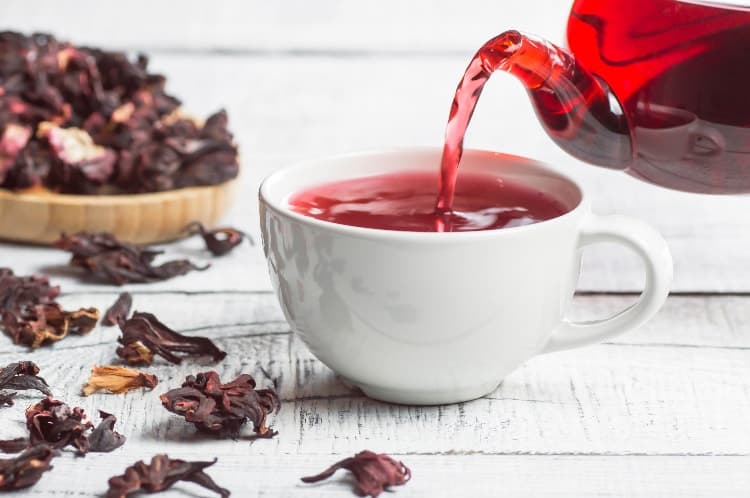
While there’s a lot written about green tea, black cohosh and other teas for menopause, there’s not much about hibiscus tea and menopause.
So, today’s post is all about how you can use hibiscus to improve hot flashes, weight gain, high blood pressure and other menopause-related symptoms.
By the end of this post you’ll see just how powerful this simple flower can be for supporting your body during this phase of life.
BENEFITS OF DRINKING HIBISCUS TEA DURING MENOPAUSE
1. Natural Anti-Inflammatory
Chronic inflammation is particularly problematic during menopause because it can exacerbate the natural hormonal changes that are already occurring in your body.
Everything from hot flashes, weight gain, sleep problems, achy joints, dry skin or thinning hair is affected by inflammation.
The good news is antioxidant-rich foods, like hibiscus, are great for lowering inflammation.
So, what makes hibiscus particularly helpful for inflammation?
Well, it’s all thanks to its high anthocyanins levels.
Anthocyanins give hibiscus tea its deep, red color and they also protect the body from the side effects of toxins, an unhealthy diet and overall stress.
Note: even if you don’t eat unhealthy food, it’s still very easy to experience inflammation. This is because much of our food isn’t as nutrient-dense as it was 100 years ago. So, you can eat healthy food but not get enough of the vitamins and minerals you need. This deficiency places stress on the body which eventually leads to inflammation.
2. May Soothe Hot Flashes
In Ayurvedic medicine, hot flashes are a sign of pitta imbalance.
This is because when there’s an excess of pitta in the body, that’s when we overheat and struggle to regain balance.
Pitta can accumulate during any phase of life and during menopause specifically, it contributes to hot flashes (as well as irritability, impatience and achy joints).
So Ayurveda relies on cooling herbs to balance out the excess pitta. Hibiscus happens to be a cooling herb and as such, it may help to relieve hot flashes and other pitta-related symptoms.
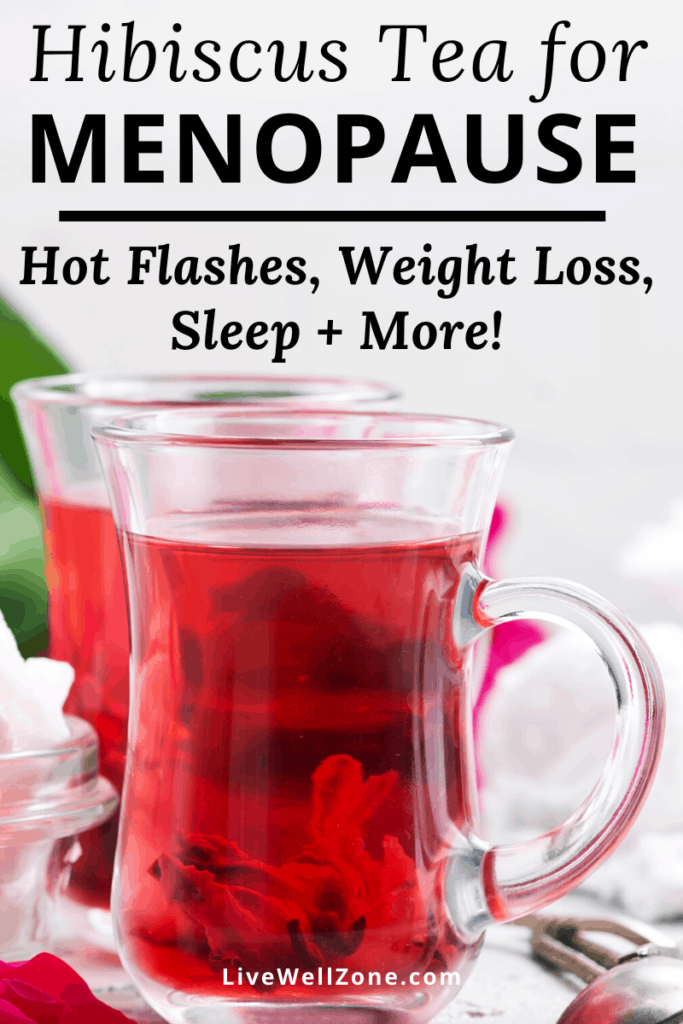
3. May Support Weight Loss
Some studies suggest that hibiscus helps with weight loss and with preventing obesity.
In fact, one human study shows that taking hibiscus extract for 12 weeks reduces body weight, BMI, body fat, waist-to-hip ratio and levels of fat in the blood.
Another animal study shows that obese mice that take hibiscus extracts have significant reductions in body weight gain.
Now, it’s important to note that both studies used hibiscus extracts.
This means the doses were quite concentrated and exceeded what you’d get from drinking hibiscus tea daily.
But, what’s important to note here is that the hibiscus plant contains natural compounds that do support a healthy weight.
So, if you simply incorporate hibiscus into your menopause diet, you get the benefit of those compounds on a daily basis.
4. May Support Liver Health
If you’re a regular reader of this blog, then you’ve heard me say that you can’t regulate your hormones or get rid of toxins without a healthy liver.
Now, when it comes to hibiscus, animal studies show that it can:
- prevent the accumulation of fat in the liver.
- reduce markers of liver damage.
- increase the concentration of liver enzymes that detox drugs from the body.
By supporting the liver, hibiscus makes it easier for your liver to work more efficiently.
So, how exactly can this help you?
Well, here’s one example of how liver health affects menopause symptoms:
- Your thyroid converts a significant portion of thyroid T4 hormone to T3.
- The thyroid also regulates your metabolism. This means weight loss (or gain) is tightly linked to having a happy thyroid.
So, when you drink a liver-friendly tea (like hibiscus) you support a healthy balance of thyroid hormones, which then improves your metabolism.
Here’s another example of how liver health affects menopause symptoms:
- The thyroid and adrenals have an inverse relationship. This means that if thyroid function is too low then adrenal function goes way high.
- When adrenal function is high, more cortisol and adrenaline is produced.
- When your adrenals are working overtime, this can worsen hot flashes (and also reduce estrogen production, which further worsens your symptoms).
- Furthermore, high cortisol wreaks havoc on your blood sugar levels and insulin sensitivity…all of which contribute to weight gain and systemic inflammation.
So, as you can see, liver health has a ripple effect on hormones and menopause symptoms as a whole.
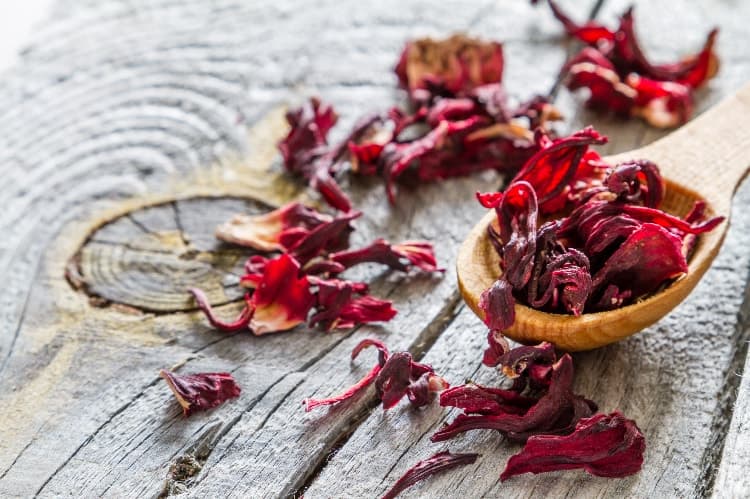
5. May Act As A Natural Antidepressant
Research shows that there’s a link between depression and oxidative stress.
If you’re not familiar with “oxidative stress” it’s basically an imbalance of antioxidants and free radicals in the body.
But where do the free radicals come from?
The free radicals usually accumulate in the body as a result of poor diet, smoking and other unhealthy lifestyle habits.
As free radicals accumulate, the body starts to experience oxidative stress (and inflammation).
All of this throws of your internal chemistry (particularly hormones) off balance.
And this can lead to symptoms like depression.
Interestingly, research shows that flavonoids in plants like hibiscus do help with depression.
Now, this is not to say that hibiscus is a replacement for any antidepressants you may already be using.
However, since flavonoids do address the underlying oxidative stress that is linked to depression, you should consider adding hibiscus tea into your routine.
6. Regulates Blood Pressure and Prevents Heart Disease
According to the American Heart Association, the risk factors for heart disease in women tend to go up during menopause.
And one of those risk factors is high blood pressure, which tends to go up during menopause (if we’re not prioritizing healthy diet and lifestyle).
Luckily, blood pressure regulation is where hibiscus tea absolutely shines!
In fact, one study showed that hibiscus tea is more effective than taking hydrochlorothiazide (a blood pressure drug).
And best of all, hibiscus tea doesn’t lead to electrolyte imbalance, which is a common side effect of hydrochlorothiazide.
Other studies also show that hibiscus tea’s ability to regulate blood pressure also works for diabetic patients (1, 2).
In addition to all this, a medical review also revealed that hibiscus tea is a normal treatment for blood pressure in at least 10 countries.
And in case you’re wondering, hibiscus works on both systolic and diastolic pressure!
HOW TO MAKE HIBISCUS TEA FOR MENOPAUSE
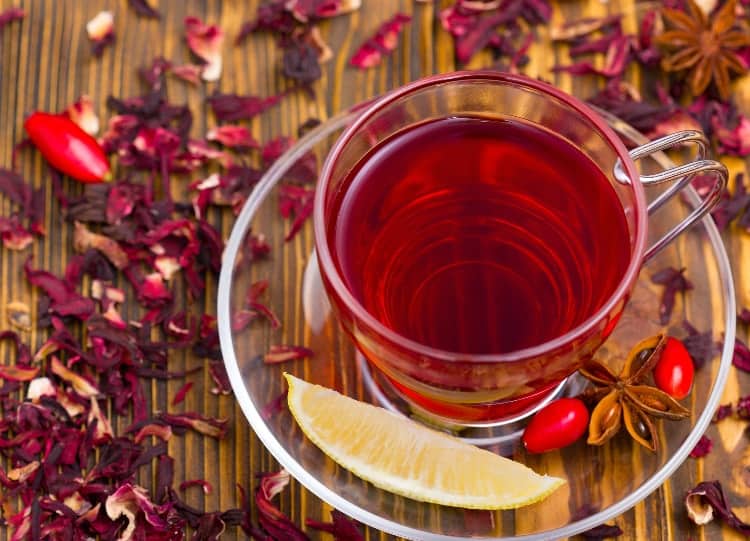
Ingredients
1 tsp dried hibiscus
1 cup boiling water
Raw honey (optional)
How To Make
- Boil water and then remove from heat.
- Add the water and tea into a tea maker.
- Allow to steep for at least 15 minutes (personally I prefer to do at least an hour for this tea and all other herbal teas)
- Drink it plain if you like the tartness. Otherwise, sweeten with some raw honey.
- You can also squeeze some fresh lemon, or mint leaves and cinnamon to change up the flavor.
- Drink up to 3 cups per day
NOTE: you can find hibiscus tea (usually in tea bags) in many health stores. You can also get this organic hibiscus online from Frontier Co-Op, which specializes in bulk herbs (they’re available on Amazon).
RELATED QUESTIONS
Does hibiscus tea lower estrogen levels?
Hibiscus supports the liver, which is necessary for detoxing excess estrogen (and other hormones). Therefore, drinking hibiscus tea can help to lower estrogen levels naturally.
What helps hot flashes during menopause?
Aside from hibiscus, consuming an anti-inflammatory diet that is rich in whole fruits, veggies and unprocessed grains is very helpful for menopause.
One of the best ways to eat more anti-inflammatory foods is to simply make a smoothie. You can learn more about this in this article on menopause smoothies.
In addition, essential oils like peppermint, geranium, jasmine and many others are also very helpful for hot flashes.
For more on essential oils and recipes you can use, read these posts:
Essential Oils for Menopause: 11 Best Oils For Relief and How To Use Them
The Only Essential Oil Roller Recipe For Hot Flashes You’ll Ever Need
DIY Essential Oil Spray For Hot Flashes: 5 Recipes To Use
What are the side effects of drinking hibiscus tea?
If you’re taking a diuretic to control blood pressure, such as hydrochlorothiazide, then you should not drink hibiscus tea. Studies show that hibiscus may interact negatively with that drug.
In addition, some research shows that hibiscus is toxic in very high amounts.
But we’re talking about amounts that far exceed the recommended 3 cups per day.
As long as you don’t exceed the recommended 3 cups per day, you can consume hibiscus regularly.
Is hibiscus tea caffeine free?
Yes, hibiscus is caffeine free because it comes from a different species of plant (compared to black or green teas).
Is it good to drink hibiscus tea at night?
Since hibiscus is caffeine free it’s absolutely safe to drink at night. Plus, hibiscus regulates blood pressure and having healthy blood pressure levels makes it easier to have deeper, comfortable sleep.
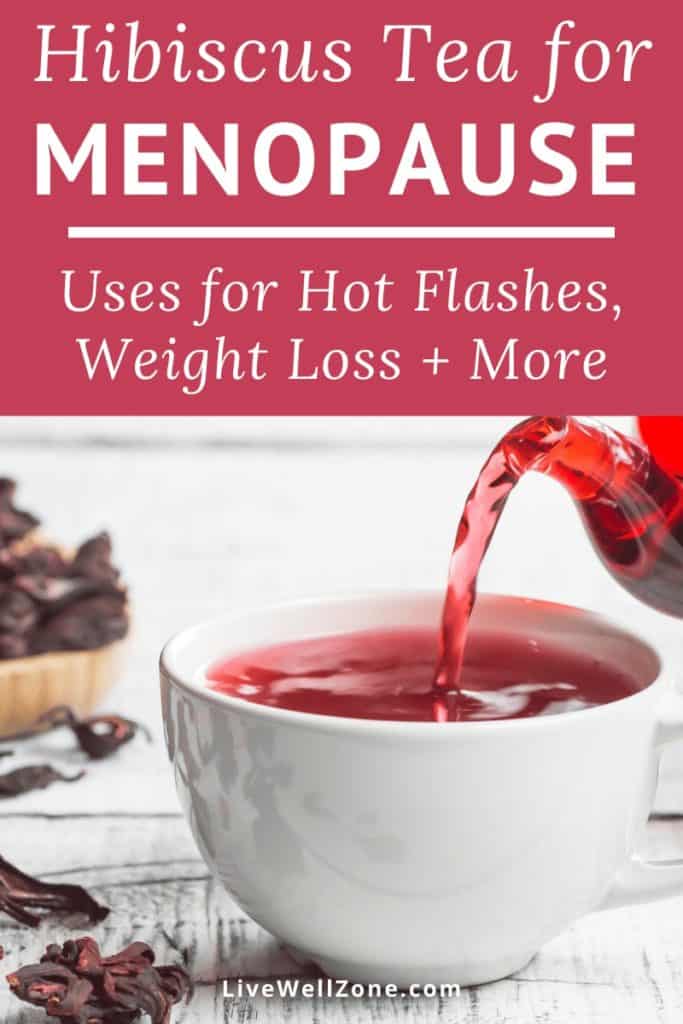
CONCLUSION: “IS HIBISCUS GOOD FOR MENOPAUSE?”
From the liver to blood pressure and hot flashes, hibiscus tea supports various organs and processes in the body that can ultimately improve menopause symptoms.
As with all natural remedies, the key to getting results from hibiscus is to be consistent.
Add it to your menopause diet and use it in conjunction with other healthy dietary choices.
Now, if you have any questions or comments about hibiscus tea and menopause, go ahead and leave your feedback below!
Related Posts:
How to Go Through Menopause Naturally: 7 Steps To Start Using Today
Best Menopause Supplements Without Black Cohosh (for 2022)
Herbs for Menopause Weight Gain (+ Best Supplement Recommendations)
How to Use Matcha Green Tea for Hormone Balance
Best Drinks for Hormone Balance: 6 Drinks and Recipes That Provide Relief
6 Herbs That Balance Hormones (That You’re Probably Not Using)


Where can i find the Hibiscus tea
You can find it online from Amazon or Mountain Rose Herbs. If your local health food store sells spices/herbs in bulk, then you can find it there as well.
I found the tea bags in the natural foods area of my grocery store. I have had tremendous success with drinking 2 cups of hibiscus tea (I pour over ice and sip at it all day…helps with dehydration. Hot liquids irritate my Rosecea). My doctor wanted to put me on a low dose med for high blood pressure …..we agreed to wait two months and see if I could find another way. ONLY change I made was the addition of this tea. Within 10 days I had my BP in the 120’s over 80’s from the 150’s over 103-6. Take BP 3 times a day since January and I am maintaining. So relieved. Also, flushing has been greatly minimized….sleeping great.
That’s really great to hear. Thanks for sharing your experience using hibiscus for menopause. It’ll definitely help and encourage others!
Am 64year old female and suffering from what I think ‘hot flashes’ as in mensopause. It affects particularly my arms and from my thighs down to my feet.This is accompanied by raised bumps and severe itching. After applying cold compress the bumps and itching goes. Would hibiscus tea help?
Hibiscus helps with hot flashes and inflammation, so you can give it a try to see how it works for you.
Gonna give this a try I’m on menopause n been with high blood pressure which I never had . So I’m on a low salt diet. But I’m gonna try hibiscus tea today
Looking forward to hearing how it works for you!
I grow hibiscus. Does it differ from red to pink or purple hibiscus?
There might be some differences, however I can’t say for sure. The sources I used for the article didn’t distinguish between types.